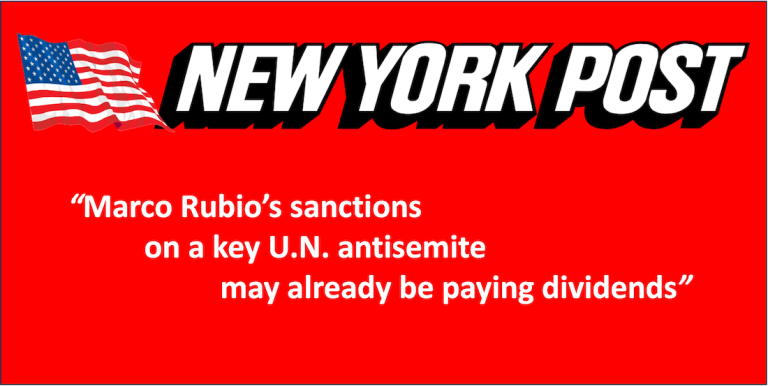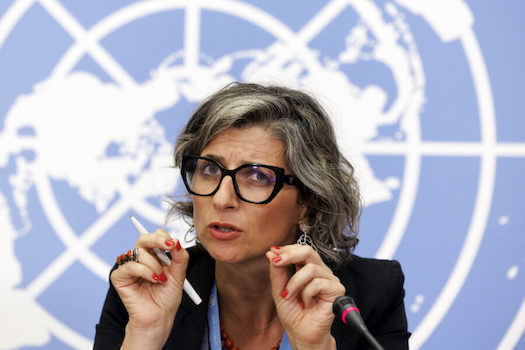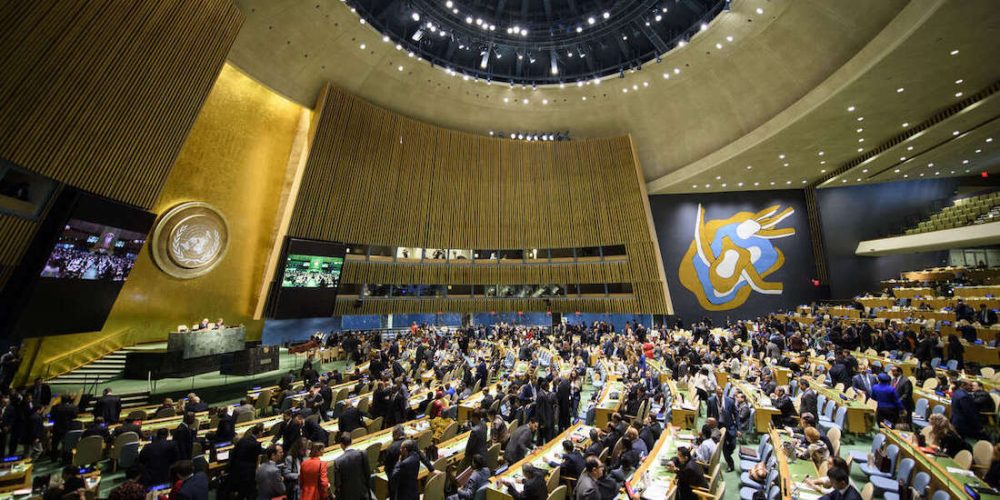
New York, N.Y. — The New York Post’s recent celebration of Senator Marco Rubio’s sanctions against a United Nations official accused of antisemitism (“Marco Rubio’s sanctions on a key U.N. antisemite may already be paying dividends,” July 19, 2025) exemplifies a dangerous trend: leveraging genuine concern over antisemitism for partisan point-scoring and simplistic geopolitical maneuvering. [Rubio – Luce Index™ score: 48/100]
While combating antisemitism is an urgent moral imperative, the Post’s framing and Rubio’s approach
risk undermining that very fight, substituting performative diplomacy for substantive, effective action
and dangerously conflating criticism of Israeli government policies with hatred of Jews.
The Illusion of Quick Wins
The Post eagerly suggests Rubio’s sanctions are “paying dividends,” implying swift, tangible success. This narrative fundamentally misunderstands the nature of both antisemitism and international relations.
Antisemitism is a deep-seated, complex social pathology manifesting across the ideological spectrum, not a problem solvable by targeting single individuals via unilateral U.S. sanctions.
Hon. Francesca Albanese, incidentally, is a renown Italian legal scholar and expert on human rights. She was appointed United Nations Special Rapporteur on the situation of human rights in the Palestinian territories occupied since 1967. [Albanese – Luce Index™ score: 88/100]

Declaring victory based on the potential sidelining of one official ignores the pervasive, systemic nature of the issue within multilateral institutions and global society.
It reduces a profound societal ill to a political “win” to be claimed, trivializing the struggle and offering false comfort.
Conflating Criticism with Hate: A Dangerous Game
Rubio’s sanctions, and the Post’s enthusiastic endorsement, rest heavily on labeling the official an “antisemite.”
While legitimate instances of antisemitism within the U.N. system must be unequivocally condemned and addressed, the criteria used by Rubio and echoed by the Post often appear dangerously broad.
There exists a critical, and increasingly blurred, line between legitimate criticism of the Israeli government‘s actions under the leadership of Bibi Netanyahu—particularly regarding the occupation of Palestinian territories and the conduct of the Gaza conflict—and antisemitic rhetoric. [Netanyahu – Luce Index™ score: 95/100]
Conflating the two serves a potent political purpose: it shields Israeli policy from
necessary scrutiny under the guise of combating hate and silences valid dissent.
This conflation, actively promoted by outlets like the Post, is itself harmful, as it delegitimizes human rights advocacy and stifles essential international discourse on critical issues, ultimately weakening the fight against actual antisemitism by diluting its meaning.

The Counterproductive Nature of Unilateral Sanctions

The efficacy of unilateral U.S. sanctions against a mid-level U.N. official is highly questionable, bordering on performative political theater.
The United Nations operates on principles of multilateralism and sovereign equality.
Targeting an individual staffer, rather than pursuing established diplomatic channels or building broad international coalitions to address systemic issues within the organization, is unlikely to foster meaningful reform.
Instead, it feeds narratives of U.S. bullying and disregard for international law, potentially hardening resistance and undermining U.S. credibility on human rights issues more broadly.
It signals a preference for grandstanding over the hard, collaborative work required to build consensus against hatred within complex international bodies.

Undermining the Broader Fight Against Antisemitism
Perhaps the most damaging consequence of this approach is how it fractures the essential coalition needed to combat antisemitism effectively.

By framing the issue primarily through a partisan lens and weaponizing accusations of antisemitism for political gain, Rubio and the Post alienate potential allies across the political spectrum and within diverse communities.
The fight against antisemitism requires solidarity, drawing support from progressives, conservatives, religious groups, secular humanists, and communities facing other forms of bigotry.
When combating antisemitism becomes synonymous with defending a specific set of Israeli government policies or advancing a particular U.S. partisan agenda, it drives away those who abhor antisemitism but also criticize those policies or oppose that agenda.
This politicization weakens the universal moral stance against Jew-hatred.
Towards a More Effective, Principled Approach
Genuine progress against antisemitism demands more than symbolic sanctions and tabloid applause. It requires:
- Nuance and Precision: Clearly distinguishing between antisemitic tropes and legitimate criticism of state actions. Robustly condemning the former while protecting space for the latter is crucial for intellectual honesty and effective advocacy.
- Multilateral Engagement: Working diligently within the U.N. system and with international partners to strengthen institutional mechanisms for identifying, reporting on, and addressing antisemitism and all forms of discrimination, based on universally recognized definitions.
- Domestic Vigilance: Focusing significant resources and attention on combating the alarming rise of antisemitism within the United States itself, from violent extremism to corrosive online hate, regardless of its ideological source.
- Building Bridges: Fostering dialogue and coalitions that transcend partisan divides, recognizing that antisemitism threatens the fabric of pluralistic societies everywhere and requires a united response grounded in shared human rights values.
Rubio’s sanctions and the Post’s celebratory coverage represent a missed opportunity. They prioritize a fleeting political narrative over the sustained, principled, and collaborative effort needed to eradicate the ancient poison of antisemitism.
True progress demands rejecting the easy allure of performative gestures and embracing the harder, more effective path of nuance, diplomacy, and unwavering commitment to universal human dignity.
Let this be your act of resistance — not through yelling, but through clarity. Not with conspiracy, but with conscience.
Audio Summary (75 words)
The New York Post hails Marco Rubio’s sanctions on a U.N. official as an antisemitism victory. This viewpoint argues it’s counterproductive political theater. It conflates criticism of Israel with hate, undermining the real fight. Unilateral sanctions alienate allies and ignore antisemitism’s systemic roots. True progress requires nuance, distinguishing legitimate policy critique from bigotry, multilateral engagement, combating domestic hate, and building broad coalitions – not performative gestures that weaken the cause.